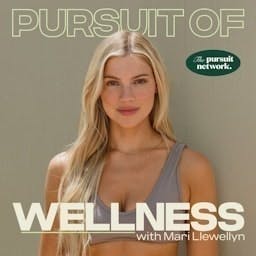.jpg)
Mindfully Integrative Show
Welcome to the Mindfully Integrative Podcast! We are dedicated to featuring inspirational and successful individuals who have embraced mindful investing to achieve optimal integrative wellness. Our podcast dives into all aspects of mindfully incorporating integrative functional health into our lives, aiming to help create a more balanced and fulfilling life. New episodes are released every Friday and cover a wide range of informative and entertaining topics, interviews, and discussions.
We explore a mindful approach to the mind-body connection with guests discussing various topics in integrative holistic health. This includes areas such as whole health, functional medicine, spiritual health, financial health, mental health, lifestyle health, mindset shifts, physical health, digital health, nutrition, gut health, sexual health, body positivity, family health, pet health, business health, and life purpose, among others.
Dr. Damaris G. is an Integrative Doctor of Nursing Practice, a Family Nurse Practitioner, a mom, and a veteran. For collaboration, interviews, or to say hi, you can contact her via email at damaris@mindfullyintegrative.com. You can also find her on LinkedIn at or https://www.linkedin.com/in/damarisdnp/. To join our membership and access resources, visit our website at https://mindfullyintegrative.com .
Please note that the information shared here is for informational and educational purposes only and should not be considered medical advice. Always consult with a physician or other licensed healthcare provider when making healthcare decisions. Enjoy the podcast!
Mindfully Integrative Show
Transform Your Life with Moderate Intensity Exercise: The Science and Practical Tips You Need
Use Left/Right to seek, Home/End to jump to start or end. Hold shift to jump forward or backward.
Can moderate intensity exercise change your life? Absolutely. Join us as we break down the science and practicalities of how activities like walking, biking, swimming, and even gardening can elevate your heart rate, boost your oxygen consumption, and drastically improve your overall well-being. By accurately calculating exercise intensity using the Coravin formula, you can precisely tailor your workouts to your personal fitness level, ensuring maximum benefit without overexertion.
This episode is a treasure trove of insights on how consistent moderate intensity exercise can enhance your mood, cognitive function, and reduce the risk of chronic diseases such as diabetes and cardiovascular conditions. Discover why maintaining an active lifestyle is crucial for better circulatory health and a higher quality of life. With practical tips and an easy-to-understand approach, we aim to empower you to make lasting changes for a healthier, happier future.
Sponsor Affiliates
Empowering Your Health
Get YOUR Own
Joburg Protein Snacks
Discount Code: Damaris15 Or Damaris18
Feeling need to Lose Weight & Become metabolically Healthy
GET METABOLIC COURSE GLP 1 REseT
This course is designed for individuals looking to optimize their metabolic health through integrative and functional medicine approaches. Whether you're on a GLP-1 medication or seeking natural ways to enhance your metabolic function, this course provides actionable steps, expert insights, and a personalized roadmap sustainable wellness.
Are you feeling stressed, tired, or Metabolism imbalanced?
Take advantage of our free mindful steps to help improve your well-being.
ENJOY ONE OF our Books
Mindful Ways Health Wealth & Life
https://stan.store/Mindfullyintegrative
Join Yearly membership ALL IN ONE FUNCTION HEALTH
Ask Us for help...
so modern intensity exercise is increasing the body's heart rate over around 120 and it gets your oxy consumption to around 70 to 80 percent. What is the benefits of this? Just like initial low intensity, it is very much so about increasing the heart rate, getting you to where you would like to be, and it's around 50 to 60% of work. So the low intensity is around 20 to 40%. Moderate intensity gets you to your heart rate to that 50 to 60 percent. Types of moderate exercise are like walking 30 minutes, biking, swimming, running, playing, jump rope walking, stairs, gardening, things of that nature. How do you calculate your moderate and low intensity and high intensity? You do this by subtracting your age from 220 to get your maximum heart rate. That's how I got this 50%. Then you're going to subtract your resting heart rate from the maximum heart rate. So if you're, and then you're going to multiply the percentage of your training intensity. So your age could be 50, your heart rate could be 70, and you're doing 50% of intensity. So 220 minus 50 equals 170. 170 minus 70 heart rate is 100. 100 times 50 plus the 70 equates you to around 120 in the heart rate. This just kind of is a formula. They call it Coravin formula. But overall, initially saying, when you're talking about low intensity, you're using about 30 to 40% of your heart rate. Moderate intensity is 50%. High intensity is 60 to 80% and above that you may be overexerting, may be overexerting.
Speaker 1:Benefits overall and from the research is a many array of things. It improves your mood, your psychological, your physical, your overall well-being. What is it? Helps with general physical function, your circulatory system, your. Any type of aerobic exercise where you're building up the oxygen within the body and the circulatory system within the body, you are giving yourself a benefit and as long as you do it within reason, giving yourself a benefit, and as long as you do it within reason. Now, on the mental side, it helps with cognitive impairment, helping decrease dementia and thinking of that, as you're building up circulatory system. So if you're building up more circulatory system, there is more blood flowing. That means there's more blood flowing to the brain and less occlusion, less occlusion in other places of the body.
Speaker 1:When you're moving more, you're having a better quality of life. When you are a well-oiled machine, you have a better quality of life. When your movements are not as aggressive, you have a better quality of life. Now the physical activity as a whole is improving your chances of chronic diseases and chronic illness, such as diabetes, high blood pressure, cardiovascular disease and frequent comorbidities that may come with lifestyle and frequent comorbidities that may come with lifestyle things that you have not changed. In addition, when it comes to lifestyle, medicine and health, we want to look at what we're doing to our bodies, and moderate intensity exercise, or any exercise at all, is the most important way of thinking. Okay.
Podcasts we love
Check out these other fine podcasts recommended by us, not an algorithm.

The Dr. Hyman Show
Dr. Mark Hyman
Functional Fertility with Dr. Kalea Wattles
Kalea Wattles
On Health for Women
Aviva Romm
Save Yourself With Dr. Amy Shah
Dr. Amy Shah
Huberman Lab
Scicomm Media
The Peter Attia Drive
Peter Attia, MD
The Metabolic Classroom with Dr. Ben Bikman
Insulin IQ
FoundMyFitness
Rhonda Patrick, Ph.D.
Change Your Brain Every Day
Dr Daniel & Tana Amen
The Dr. Josh Axe Show
Dr. Josh Axe
Pursuit of Wellness
Mari Llewellyn & Pursuit Network
Feel Better, Live More with Dr Rangan Chatterjee
Dr Rangan Chatterjee: GP & Author
The Level Up Podcast w/ Paul Alex
Paul Alex Espinoza
Faith Over Fear
Jennifer Slattery, Faith Over Fear Author and Speaker
